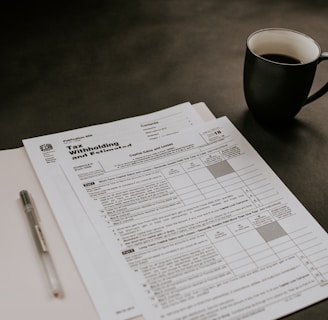What you need to know about Quarterly Taxes
By understanding quarterly tax requirements and deadlines, you can ensure compliance with IRS regulations and avoid potential penalties. If you're unsure about your specific situation, it's always wise to consult with a tax professional.
Stephany Pruitt
2/1/20251 min read


Who Needs to Pay Quarterly Taxes and When Are They Due to the IRS?
Quarterly tax payments are a crucial aspect of the U.S. tax system, particularly for those who don't have taxes regularly withheld from their income. Here's what you need to know about who should pay quarterly taxes and when they're due:
Who Needs to Pay Quarterly Taxes?
Self-employed individuals: Freelancers, independent contractors, and small business owners who expect to owe $1,000 or more in taxes for the current year17.
1099 workers: Those who receive 1099 forms instead of W-2s1.
Businesses: Corporations that expect to owe at least $500 for the tax year1.
Some investors: People with significant investment income or capital gains3.
Landlords: Those with rental income that isn't subject to withholding1.
Individuals with insufficient withholding: If your withholding and refundable credits will cover less than 90% of your tax liability for this year, or 100% of your liability last year (110% for higher earners)1.
When Are Quarterly Taxes Due?
For the 2025 tax year, the estimated tax payment due dates are46:
First Quarter (Jan. 1 - March 31, 2025): April 15, 2025
Second Quarter (April 1 - May 31, 2025): June 17, 2025
Third Quarter (June 1 - Aug. 31, 2025): Sept. 16, 2025
Fourth Quarter (Sept. 1 - Dec. 31, 2025): Jan. 15, 2026
Note that the fourth quarter payment for the 2024 tax year is due on January 15, 202514.
Important Considerations
If a due date falls on a weekend or legal holiday, the payment is due on the next business day6.
You can pay all estimated taxes by September 15 or in two installments by September 16, 2025, and January 20264.
Failure to pay enough tax through withholding and estimated tax payments may result in penalties1.
By understanding these requirements and deadlines, you can ensure compliance with IRS regulations and avoid potential penalties. If you're unsure about your specific situation, it's always wise to consult with a tax professional.
info@bookkeeper.tax
(734)402-7777
© 2025. All rights reserved, Starrany, LLC
Intuit® and QuickBooks are trademarks and service marks of Intuit Inc., registered in the United States and other countries. Intuit®, QuickBooks®, and QuickBooks ProAdvisor® are registered trademarks of Intuit Inc., used with permission
Office Hours
Monday - Friday:
9:00 AM - 7:00 PM
Saturday By Appointment
Let US Help
Disclaimer for Bookkeeping, Tax Preparation and Tax Planning Services
The information provided on this website is for general informational purposes only and should not be considered as professional legal, financial, or tax advice. We are bookkeepers and tax preparers, not lawyers or Certified Public Accountants (CPAs). Our services are limited to bookkeeping and tax return preparation. We do not provide legal advice, financial planning, or investment recommendations.
The information provided on this website is for general informational purposes only and should not be considered as professional legal, financial, or tax advice. We are tax preparers and bookkeepers, not lawyers, financial advisors or Certified Public Accountants (CPAs). Our services are limited to tax preparation, basic tax planning, and bookkeeping. We do not provide legal advice or services that require CPA certification or investment advice. The information we provide should not be used as a substitute for consultation with qualified legal, financial advisor or accounting professionals.
The accuracy and completeness of our services depend on the information provided by our clients. We are not responsible for any errors or omissions resulting from inaccurate or incomplete information supplied to us. Clients are encouraged to review all documents carefully before signing and to consult with appropriate professionals for specialized advice tailored to their individual situations. By using our services, you acknowledge that you have read, understood, and agree to the terms outlined in this disclaimer. We reserve the right to modify this disclaimer at any time without prior notice. By using our services, you acknowledge that you have read, understood, and agree to the terms outlined in this disclaimer. We reserve the right to modify this disclaimer at any time without prior notice. This disclaimer is provided to clarify the nature and limitations of our services. If you have any questions about this disclaimer or our services, please contact us directly.
